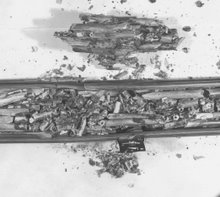From The Huntsville Times
Von Braun 'insisted we were all a team'
Wednesday, January 30, 2008
By MIKE MARSHALL
Times Staff Writer mike.marshall@htimes.com
Ceremony is tribute to cooperation between German, U.S. scientists
The first of them arrived holding top coats and walking canes, some stoop-shouldered as they filed past the Saturn V, their greatest achievement. They were giants of their time, the scientists credited with building a town and America's space program. In the beginning, they were the most famous team in Huntsville, 118 Germans who spoke boldly about satellites and rockets.
The last of their ranks received the star treatment again Tuesday morning at the Davidson Center for Space Exploration, the new $22 million building hosting its inaugural event.
As part of the city's 50th Anniversary of America in Space, the members of Wernher von Braun's rocket team were honored with a plaque from Marshall Space Flight Center's Retiree Association. The surviving members of the team sat side-by-side in chairs with their last names across the backs. One was in a wheelchair. Another wore dark glasses on an overcast day because he's legally blind. "I drove my own car," said Oscar Holderer, the youngest of the team at 88. "There are so few of us left. I felt an urge to come."
For years, they were inseparable, linked by their quest to put the first men on the moon, among other things. But now, they see each other infrequently, mostly at funerals and other special occasions, such as Wernher von Braun's 95th birthday party last spring at an Italian restaurant on Airport Road. "Some we haven't seen in 20 years," said Astra von Tiesenhausen, the wife of George von Tiesenhausen, another of the German scientists.
Konrad Dannenberg, believed to be the eldest member of the team at 95, was there. So were Walter Jacobi, Walter Haeussermann, Rudolf Schlidt and Hans Fichtner.
Ernst Stuhlinger, one of von Braun's chief aides, did not attend because of illness. Another member of the team, Werner Dahm, died Jan. 17 at an assisted-living facility in Huntsville.
By Dannenberg's count, nine members of von Braun's team are still alive. Six of them are original members of the team. The other three, he said, moved from Germany after the rest of the team arrived in Fort Bliss, Texas. "I think of history today," Dannenberg said, "even back to Peenemunde." During World War II, von Braun's team worked at Peenemunde, a rocket-missile laboratory on the Baltic Sea. After the war, the team moved from Germany to the Fort Bliss, Texas.
In the spring of 1950, most of them relocated to Huntsville. "I never saw any animosity here, even as a kid," said Rolf Sieber, whose father, Werner, was an original member of the team.
As an example of the city's attitude toward the Germans, Sieber cited an incident when he was a teenager. "I was walking downtown one day, and three or four teenagers were acting tough," he said. "I said, 'Oh, they figured out I was German.' They said, 'Are you one of these damn Yankees?' They didn't care I was German."
Much of Tuesday's ceremony, about one hour, was a tribute to the cooperation between the German and American scientists at Marshall Space Flight Center. Near the end, Jim Splawn, president of the Marshall Retirees Association, asked the spouses of the German rocket team members to stand. Then he recognized the American engineers, then the families of the American and German scientists. If von Braun were here today, he'd be most pleased," said Brooks Moore, a former NASA executive and past president of the Marshall Retirees Association. "He insisted that we were all a team. He didn't want the Germans and the Americans to be two different groups."
Then, just before it was over, Dannenberg spoke on behalf of the German scientists. "I selected myself to be the spokesman," he said later. At first, his wife, Jackie, began to push his wheelchair toward the podium. "Let me stand up," he said. Standing, Dannenberg spoke for a few minutes, talking mostly about the plaque and the Saturn V that dominated the Davidson Center. "For those who are not with us today," he said, "I think this will be a memorial for many years to come." When he finished, he sat down in his wheelchair, returned to his seat in the front row, and smiled at the other German scientists. Only Holderer appeared to look back at him. He nodded at Dannenberg, then began to gesture. "I did this,'' said Holderer, applauding. "I clapped my hands, so he could see me. I couldn't catch all his words, but it was all right."
Saturday, February 23, 2008
Subscribe to:
Post Comments (Atom)

No comments:
Post a Comment